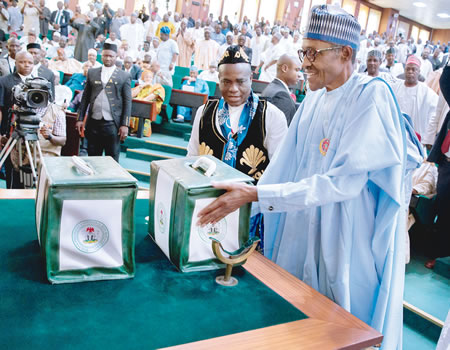PRESIDENT Muhammadu Buhari on Friday presented the 2023 budget proposal to the National Assembly in which he proposed new loans totalling N8.8 trillion to part finance a deficit of N10.78 trillion. He also reaffirmed his commitment to ensuring a smooth transition to another democratically elected government in 2023.
The total budget size is N20.51 trillion which is N750 billion above the N19.76 trillion approved by the Senate and the House of Representatives in the Medium Term Expenditure Framework (MTEF) and Fiscal Strategy Paper (FSP) passed on Wednesday and Thursday by both chambers.
President Buhari said: “We expect total fiscal operations of the Federal Government to result in a deficit of 10.78 trillion naira. This represents 4.78 per cent of estimated GDP, above the three per cent threshold set by the Fiscal Responsibility Act 2007.
“As envisaged by the law, we need to exceed this threshold, considering the need to continue to tackle the existential security challenges facing the country.
“We plan to finance the deficit mainly by new borrowings totalling 8.80 trillion naira; 206.18 billion naira from privatisation proceeds and 1.77 trillion naira drawdowns on bilateral/multilateral loans secured for specific development projects/programmes.
“Over time, we have resorted to borrowing to finance our fiscal gaps. We have been using loans to finance critical development projects and programmes aimed at further improving our economic environment and enhance the delivery of public services to our people.”
According to the president, who described the 2023 proposal as a budget of ‘Fiscal Sustainability and Transition’, the principal objective in 2023 will be to “maintain fiscal viability and ensure smooth transition to the incoming administration.”
The 2023 budget parameters and fiscal assumptions presented by Buhari is based on $70 oil price benchmark; 1.69 million barrels (inclusive of condensates of 300,000 to 400,000 barrels per day) daily oil production; N435.57/$ exchange rate; 3.75 per cent projected GDP growth rate and 17.16 per cent inflation rate.
ALSO READ FROM NIGERIAN TRIBUNE
The proposed N20.51 trillion expenditure for the 2023 fiscal year comprises of N10.78 trillion fiscal deficit, representing 4.78 per cent of estimated GDP, above the three per cent; statutory transfers of N744.11 billion; non-debt recurrent costs of N8.27 trillion; personnel costs of N4.99 trillion; pensions, gratuities and retirees’ benefits of N854.8 billion; overheads of N1.11 trillion; capital expenditure of N5.35 trillion, including the capital component of statutory transfers; debt service of N6.31 trillion; and sinking fund of N247.73 billion to retire certain maturing bonds, according to the budget estimates joint session of the National Assembly.
According to the president, based on these fiscal assumptions and parameters, total federally collectible revenue is estimated at N16.87 trillion; total federally distributable revenue is estimated at N11.09 trillion in 2023, while total revenue available to fund the 2023 Federal Budget is estimated at N9.73 trillion including the revenues of 63 government-owned enterprises (GOEs).
Oil revenue is projected at N1.92 trillion, Non-oil taxes are estimated at N2.43 trillion, Federal Government independent revenues are projected to be N2.21 trillion; other revenues total N762 billion, while the retained revenues of the GOEs amount to N2.42 trillion.
Buhari also informed the lawmakers of ongoing plans to transmit the draft of the proposed amendment to the Finance Bill, 2022 alongside the 2023 Appropriation bill, with a view to supporting the realisation of fiscal projections, current tax and fiscal laws/regulations that are being reviewed.
He said: “The 2023 Appropriation Bill aims to maintain the focus of MDAs on the revenue side of the budget and greater attention to internal revenue generation. Sustenance of revenue diversification strategy would further increase the non-oil revenue share of total revenues.
“Breakdown of the proposed expenditures showed of N20.51 trillion is proposed for the Federal Government in 2023. This includes N2.42 trillion spending by government-owned enterprises.
“Total fiscal operations of the Federal Government to result in a deficit of N10.78 trillion, representing 4.78 per cent of estimated GDP, above the 3 percent threshold set by the Fiscal Responsibility Act 2007. “As envisaged by the law, we need to exceed this threshold considering the need to continue to tackle the existential security challenges facing the country.”
On his part, the Senate President, Ahmad Lawan, warned of the danger the monumental loss of oil revenues due to activities of oil thieves who steal crude oil on daily basis poses to the economy. He said the situation becomes more unfortunate with the budget deficit estimated at N7 trillion and the grim prospect of its increase to about N11.30 trillion as presented in the 2023–2025 Medium Term Expenditure Framework/Fiscal Strategy Paper (MTEF/FSP) is factor in.
“With conflicting figures, projections have put our losses from this malaise at between 700,000 to 900,000 barrels of crude Oil per day, leading to about 29 to 35 percent loss in Oil revenue in the first quarter of 2022. This represents an estimated total fall from N1.1 trillion recorded in the last quarter of 2021 to N790 billion in the first quarter of this year.
“The situation has worsened. Recently, the loss of our Oil has reached one million barrels per day. Translated into monetary terms, our loss is monumental. The figures show we are not able to meet the OPEC daily quota of 1.8 million barrels per day.”
Senator Lawan averred that the oil thieves “are the worst enemies of our country as they have declared war on the country and its people,” adding that it is time to take drastic and desperate measures against the thieves.
“I strongly feel that if we do not take the necessary measures to stop the thieves immediately, our economy will be devastated, as efforts to provide infrastructure and diversification of the economy would both be thwarted,” he said.
Lawan expressed optimism that Nigeria could reduce the fiscal deficit by stopping the crude oil theft and consider other options to source more revenues for government.
“I believe that it is imperative to review the waivers and concessions government has granted to the tune of N6 trillion. In a difficult time like this, some of the waivers may no longer be justified,” the Senate President said.
The Speaker of the House of Representatives, Honourable Femi Gbajabiamila, reiterated the resolve of the ninth National Assembly to “finish strong” by ensuring that the appropriation bill is passed before the end of the year.
Gbajabiamila gave the assurance that the National Assembly “will not, in the quest for timely passage, fail to do the due diligence expected of us by the Nigerian people.”
He said: “The reforms to the budget process initiated in the ninth Assembly have helped streamline the appropriations process and the oversight system. We have set a standard for others to match or answer for. This is to the credit of all those who worked to achieve these outcomes, particularly the senators and honourable members.
“I have often said that a budget reflects priorities. National security, healthcare, education, public infrastructure and human capital development are the priorities we have pursued in the ninth Assembly. Every Appropriation Act we have considered and passed has reflected these priorities to different degrees. The 2023 Appropriation Act will be a budget of consolidation; our last, best opportunity to ensure that ongoing projects across the country are completed before the end of the administration.”






